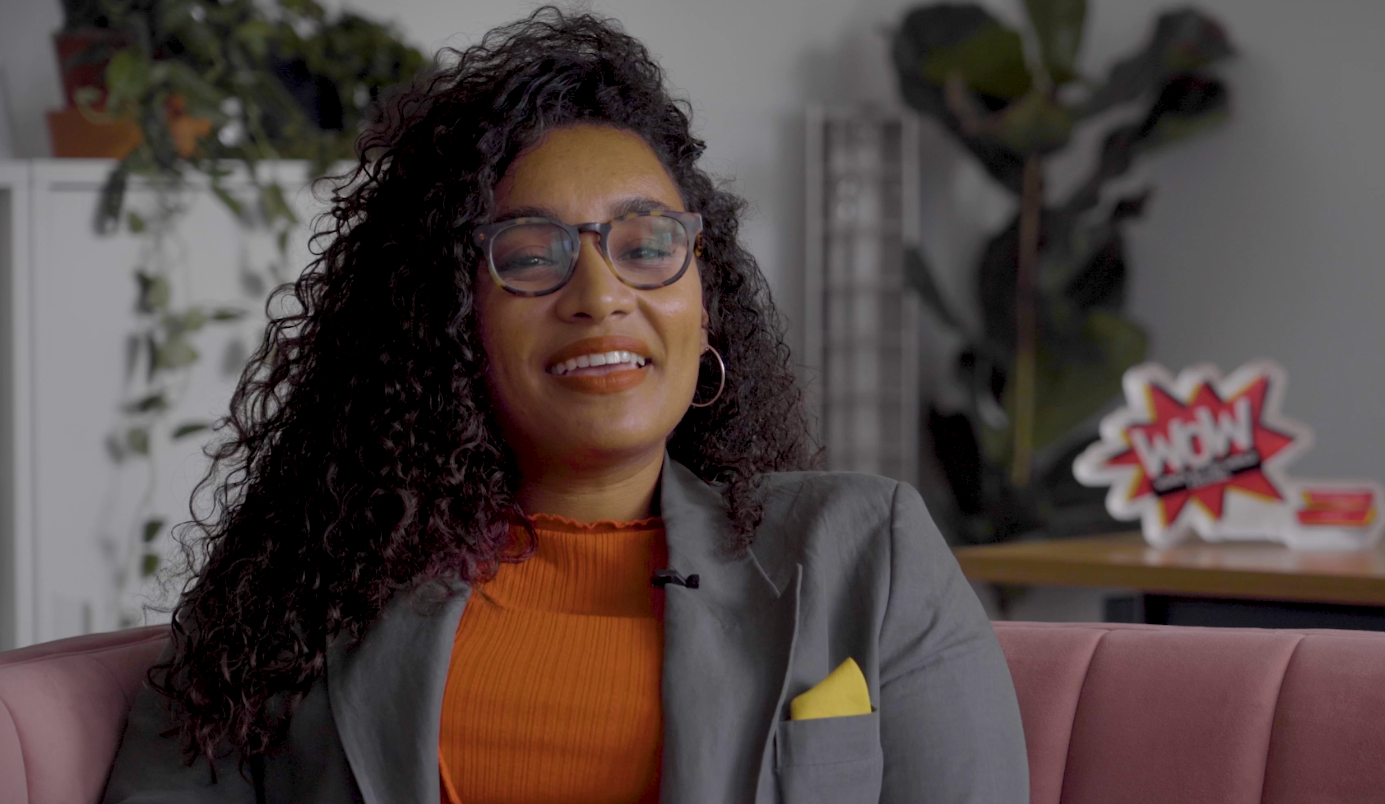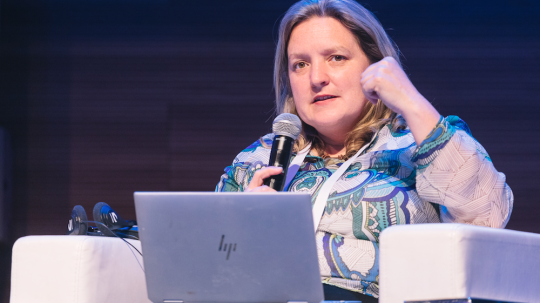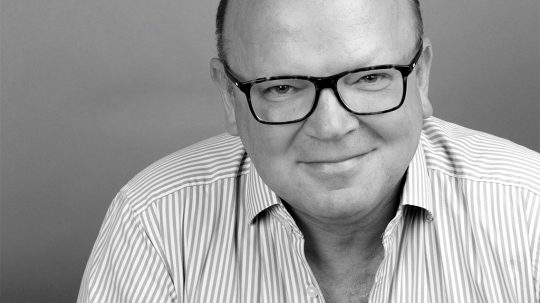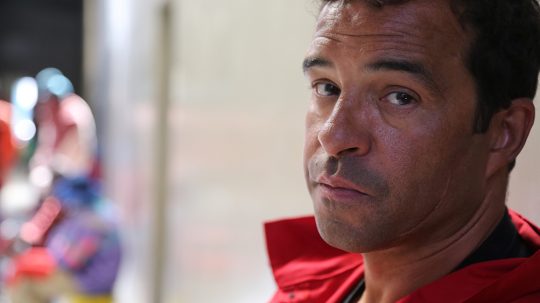In the latest instalment of our Big Questions series, we interviewed gal-dem CEO, and Equity & Inclusion Practitioner, Sereena Abbassi, who explained why we need to be having more of a conversation around class. gal-dem is both an online and print magazine that tells the stories of people of colour from marginalised genders. Abbassi herself has a history of taking activism into the corporate space, with numerous previous roles championing inclusion in the workplace.
Watch the video here and read the full interview below.
EachOther:
Could you introduce yourself and describe what you do in 15 words or fewer?
Sereena Abbassi:
My name is Sereena Abbassi and I’m CEO of gal-dem. Most people think we are just a magazine, but we’re so much more. We’re actually a media company. We are committed to making sure that we showcase and amplify the voices of those that aren’t typically represented, from an editorial standpoint within the media.
We were founded by Liv Little, and Liv founded gal-dem when she was at university. Liv is a black queer woman. And she founded it as a collective. It was a collective of people that worked on a voluntary basis, because they were studying journalism, most of them, at the time. This isn’t true for Liv. And they were shocked at how white journalism was and still is. So gal-dem was created just to showcase the stories of people that are of colour, but also, it really is just a different perspective on a situation. Our content isn’t black content or brown content. Our content is content for everyone. It just so happens to be that the people that are writing the content are people of colour.
EachOther:
What advice would you give to a 10-year-old you?
Sereena Abbassi:
What advice would I give to a 10-year-old me? I would give the advice of: back yourself. I think backing yourself is really important. To be fair, I kind of did that as a 10 year old, I was very, very confident. And I would also give the advice of ask for what you want. And you know what, being rejected is a huge part of that process, like whether it be romantically – the amount of times I’ve romantically been rejected – or professionally, but if you don’t ask you don’t get.
EachOther:
What would you say is the most important lesson you’ve learned in the last few years?
Sereena Abbassi:
What’s the biggest lesson that I’ve learned over the last few years? I would probably say the importance of boundaries. I kind of knew it before, but I think I really felt it and took it into my body. And actually the detrimental impact that happens when you don’t do that when you’re particularly working in the social justice space. Pre gal-dem, I’d built a career going into organisations and creating cultural change, essentially taking activism into primarily corporate spaces in fact. And it does come at a bit of an emotional cost if you don’t put those boundaries in place. So yeah, boundaries is definitely what I’ve learned.
EachOther:
Who would play you in a movie of your life?
Sereena Abbassi:
Who would play me in a movie of my life? Can I play myself? Is that possible? You know, I used to act. Yeah, I would love to play myself. In fact, I kind of feel like at some point, maybe in my 60s, I’ll like go back into acting. But yeah, there’s no actor that’s really standing out to me that I feel is worthy enough.
EachOther:
What would you say you’re most proud of?
Sereena Abbassi:
I am most proud of the people that I have in my life. I’ve just got such amazing people in my life. Really incredible, interesting, warm hearted, generous, and I feel like that is my biggest asset. The incredible people that I’ve met, the generosity that I’ve been met with, in my younger years of sleeping on people’s couches and just trying to figure things out. People have just always been so open and and I now repay that to others. We’ve currently got people living with us whilst they try and figure things out. It’s great.
EachOther:
So is there anything that you’d like to achieve that you haven’t yet?
Sereena Abbassi:
There’s multiple things that I’d like to achieve that exist outside of gal-dem, but obviously, I’ve just begun my journey with the organisation, and there’s so much that I would love us to achieve. I would love for us to get to a point where we’ve got local voices in every single territory across the globe, that is kind of like the goal.
I want absolutely every single person on the planet to have access to us, the people that need to have access to us because they just feel like they don’t see themselves represented. And when I say see themselves represented, I’m not just talking about like phenotypically, you know, I think we have to get away from that notion of representation literally just being ethnicity or gender. I’m also talking in regards to, “Do I see someone that has the same ethos as me?” That’s what that’s what I want to achieve, I want the whole world to have access to us, the ones that need us, but the ones that also need to have a shift in their thinking, a different perspective on the world as well.
EachOther:
If you could immediately put right one injustice in the UK right now, what would it be and why?
Sereena Abbassi:
If I could put right one injustice in the UK, like immediately, it would be about us having more of a conversation around class, which would lead to us becoming a republic and getting rid of the monarchy. Class isn’t even a protected characteristic in the UK. And because of that people can actually discriminate against people based on their class, and there’s nothing legally to protect them. The only way that we can have those conversations, the only way that class can be made a protected characteristic, I think, is for us to actually be a republic. And I know the monarchy means so much to some and less to others. But yeah, class would be the thing.
What I’m really enjoying at the moment, which I think is the silver lining to the cost of living crisis, is I think a lot of the conversations that were born out of the Black Lives Matter movements have had a direct result in us having more of a conversation around class within the mainstream. I do think the Black Lives Matter movement has had a huge impact. Even the reframing of the working class – it’s now being framed as working people. And there’s more of a discourse than there definitely was two, three years ago. And I do attribute that a lot to the Black Lives Matter movement. The resurgence of it, or it entering the mainstream, should I say, in the UK.
EachOther:
Which is the most important human right to you?
Sereena Abbassi:
What’s the most important human rights for me? I probably would say, I think there’s something in that we need to critique, because there’s no universal human right. It doesn’t exist, because if it did exist, people wouldn’t be drowning in the Channel trying to get over here. So I think the most important human right is, kind of like your motto as like an organisation. It’s about putting the human back into human rights, because actually, I think it’s just completely disappeared. And so I wouldn’t be able to pinpoint one human right in particular, I think it’s just us acknowledging each other as full humans, as we all are. And with that comes the full breadth of what human rights should be.
EachOther:
Do you have any ideas how we could heal the divisions in society right now?
Sereena Abbassi:
I do have some ideas about how we could heal the divisions within our society. And I think actually it starts with the conversations around class. I do believe that class is one of the few identities that sits across all different walks of people. And I think if we can unite, which we’re seeing with, obviously trade unions have always existed, but, we’re seeing this energy.
And I also I’m cognisant of the fact: do I just exist within this echo chamber? Because for me, it’s very present, and we’ve just unionised, which I’m feeling so proud about. And I think it’s us acknowledging how class is the governing tool that has suppressed the vast majority of us, with the exception of the landed elite class.
EachOther:
Was there anything else that you’d like to share, that we haven’t covered already?
Sereena Abbassi:
When we think of class, there’s two aspects to it. Most times we bring together the economic and the social as one we say socioeconomic. But actually, I’m of the school of thought that we need to be separating these out. And we need to see social class and economic class as being very distinct. Pierre Bourdieu, I think his name is, he talks about how class exists in three ways. You’ve got your economic, you’ve got your social, and you have got your cultural. Now, what we do at gal-dem, we give people opportunities that don’t have that inherited black book some people acquire from their families.
We give people their first byline, and that’s something that I want us to continue to do, for as long as we exist as an organisation. But with that, it does take a lot more work for us on the editorial side of things. The editors work so hard, they are spending a lot of time coaching, guiding, mentoring these typically young writers. Not always young. First time writers.
We are a cultural political organisation, we’re very politically aligned here. And that’s really important to us, that means that we can actually just get on with the work that we do. Where we want to get to is where we actually change policies, from a standpoint where we’re not working with the government, but we can create such a huge noise where, a bit like a Marcus Rashford, for instance, where we can actually change people’s lives because the government start paying attention to what we’re doing and the other communities that we’re working alongside.
The biggest changes that I want to bring with gal-dem, it really is us having people in different parts of the world speaking their truth, because I think it’s really easy being in the West. And even though we’re people of colour, but being in the West, we need to make sure that we don’t reproduce a colonial dynamic, where we’re speaking up and speaking for other people in different territories, different regions of the world. So yeah, that’s a real huge thing for me, I really would love us to just have representation across the globe.




